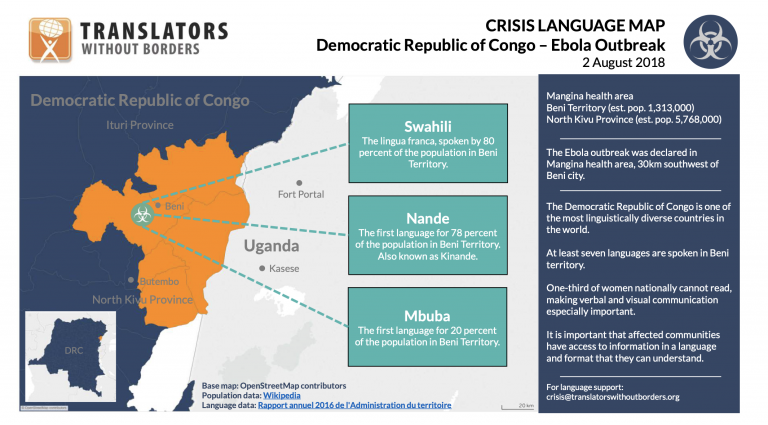
Carte linguistique en français
On 1 August 2018, the government of the Democratic Republic of Congo (DRC) declared an outbreak of Ebola virus in Mangina, North Kivu Province. Four cases of Ebola had been confirmed by laboratory testing, and 20 people had died of hemorrhagic fever in the area. Ongoing insecurity in the area may impede access to information and appropriate care for those who need it. People in the affected communities urgently need information about how to keep their families safe from the disease, how to spot early symptoms, and where to go for help.
DRC is one of the most linguistically diverse countries in the world, with more than 200 languages. At least seven languages are spoken in Beni Territory, where Mangina is located. Swahili is the lingua franca, but local residents speak a range of languages as their mother tongues. Nande (78 percent) and Mbuba (20 percent) are the most prevalent, but may not be understood by others. French is spoken by an educated minority. Literacy levels are low: One-third of women nationally cannot read, making verbal and visual communication especially important. Key languages across the border in Uganda include Swahili, Nyankore, Konzo (a variety of Nande) and Tooro.
In times of need, communication with communities is key. Yet emergencies can strain local communication infrastructure, and those who provide language services may themselves be affected.
To alleviate suffering and contribute to rapid recovery, it is important to get life-saving information to communities quickly, including through radio broadcasts and mobile technology, in the languages of those affected. To ensure understanding among less educated individuals and second-language speakers, communication should be short, simple, and clearly illustrated. Important information — including how to access services and where to report abuse — should be provided in plain language, absent of jargon, and with pictures when possible.
To find out how to support Translators without Borders’ work in crisis response, email us: info@translatorswithoutborders.org.
For more information on TWB/CLEAR Global maps, contact us at maps@clearglobal.org.